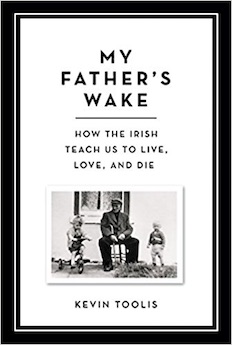By Corey Wronski-Mayersak
My Father’s Wake is a book of valuable insights, although a warning is in order: it is likely to be an emotionally charged journey for many readers. Kevin Toolis issues a call for us to think deeply about our relationship with death, as well as about the beauty of our relationships with those whom we love. He provokingly suggests that Western society has “pulled the curtains across…and turned death into a whisper.” His call deserves attention, and the frankness of his narration demands it as he tries to open those curtains.
Toolis pushes us to confront what he calls the “Western Death Machine,” suggesting that many in the twenty-first century West are distanced from the idea of death and from contact with the dying, and he details several ways we avoid seeing and even openly speaking about death. He cautions that in losing an intimate connection to death we have lost important aspects of our ability to prepare for our own death and cope with the deaths of others whom we love.
The book pulls no punches in highlighting the stark realities that readers might want to ignore: Toolis goes so far as to dare readers to calculate their life expectancy, their “actuarial death date,” providing a formula for doing so and challenging readers to write that date down in a place on the page, to confront it in black and white.
Ultimately, he urges “communally accepting death into our lives” and absorbing the lessons that can emerge from that communal confrontation: how to deal with sorrow, support one another, love one another unselfishly, and more. As a model to make readers think about the connections they may be lacking, he offers the tradition of the Irish wake, still the standard practice on his family’s home island off the western coast of Ireland’s County Mayo. The rites of the Irish wake he describes include family and friends being a presence for the dying (physically, emotionally, and spiritually supporting the dying in their final moments), loving preparation of the deceased’s body by family members, keening (and more generally, unabashed outpourings of emotion), laying out at home, a vigil, and other ceremonial acts. The entire process is decidedly public, the work of a whole local community that attends the wake and assists the family.
Toolis also draws on scenes of death and mourning in classical literature, and particularly Homer’s Iliad, to provide further contrasts to the current Western Death Machine and to demonstrate historical shifts in Western attitudes.
A real strength of the book is its vivid, moving description, especially of mourners’ experiences witnessing death in diverse circumstances. In one especially affecting scene, Toolis painstakingly details the stark hospital “cubicle” in which his brother died, and how the cold, generic, cramped space literally allowed neither time nor room for a gentle death and mourning. In another especially powerful scene, he describes returning to the island of his familial home to face the sight of his dying father, emaciated in his final stage of pancreatic cancer. Touching scenes of family outpourings of emotion are no less vivid. Toolis even offers powerful descriptions of landscape. He paints the island of his familial home in all its “elemental fury,” drawing readers into a scene of its howling wind, crashing waves, and sea mist.
Some of the book’s most powerful and thought-provoking moments come in close-up descriptions of conversations among wake-goers when Toolis takes us into the scene at his father’s wake. Among other things, wake-goers talk about experiences with death: what they have witnessed, grave locations, past practices, and more. Under the dominance of the “Western Death Machine,” some may find such discussions awkward, inappropriate, or morbid. But Toolis sees a therapeutic value in these conversations within the special circumstance of the wake, suggesting that through them “the burden of death” is somewhat eased, “shared out, talked over and tamed amongst the watchers and the wake-goers.” It is a moment that powerfully conveys what might be lost when society does not allow a space for that open sharing and mourning.
The book is at all points an engaging read. However, it takes a long time for Toolis to clarify the lessons from the Irish wake, and thus the focus of the book is sometimes clouded. Despite the title, much of the book is less about lessons from the Irish than a range of meditations on death and Toolis’ experiences confronting death throughout his life – his own brush with death when he contracted tuberculosis, his struggle to cope with his brother’s death from cancer, his investigative reporting on death in war zones, his observation of practices in city morgues, and more. At points the book feels more like a broader memoir and does not quite align with what the title frames. But the winding path does not make the book any less poignant.
Additionally, Toolis’ characterization of the “Western Death Machine” sometimes feels like an overly broad sweep, not fully acknowledging the vitality of many cultural and religious traditions surrounding death that still endure in the West. Again, however, this does not diminish the power of the book’s insights and their implications.
My Father’s Wake is an emotional and psychological challenge, but it thoroughly rewards those willing to brave it. It will make readers question societal norms and think deeply, and accordingly ought to be embraced by those pursuing a life of the mind. It will make readers reconsider their relationship to the inevitable – the reality of death that is always there, “terrifyingly ordinary,” in Toolis’ words, although often pushed out of sight and out of mind.
Corey Wronski-Mayersak (ΦBK, Goucher College, 2002) is an Associate Professor of English at McDaniel College and a resident member of the Delta of Maryland chapter of Phi Beta Kappa.




